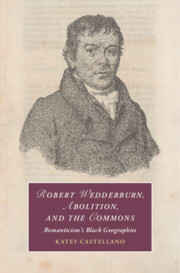Refine search
Actions for selected content:
3 results
Chapter 1 - Against Private Property
-
- Book:
- Robert Wedderburn, Abolition, and the Commons
- Published online:
- 09 January 2025
- Print publication:
- 23 January 2025, pp 25-44
-
- Chapter
- Export citation
Chapter 2 - From Plantation to Prison
-
- Book:
- Robert Wedderburn, Abolition, and the Commons
- Published online:
- 09 January 2025
- Print publication:
- 23 January 2025, pp 45-62
-
- Chapter
- Export citation

Robert Wedderburn, Abolition, and the Commons
- Romanticism's Black Geographies
-
- Published online:
- 09 January 2025
- Print publication:
- 23 January 2025
